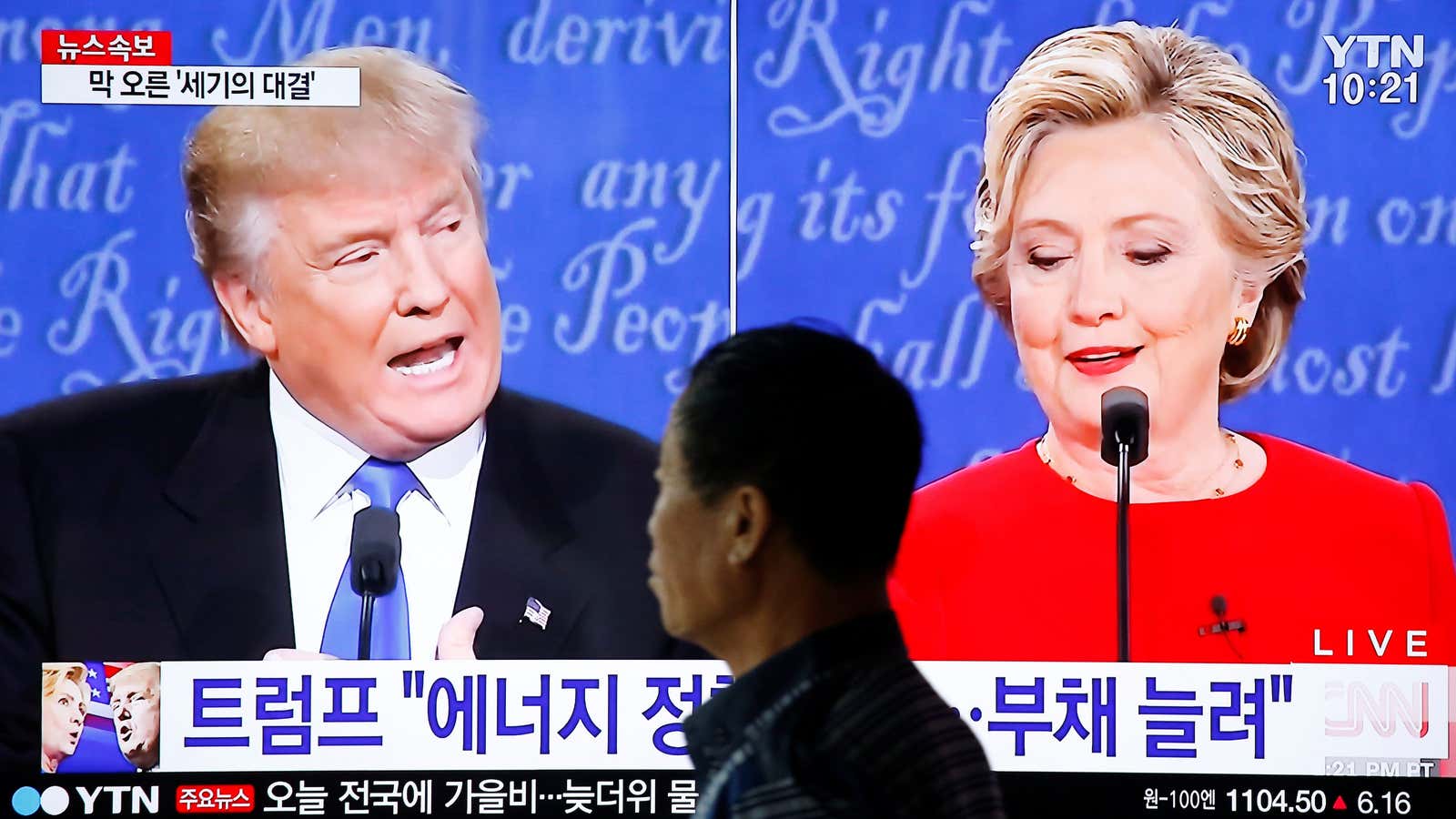US politics made a screeching U-turn on Election Day. After weeks of Hillary Clinton being the projected front-runner, Donald Trump made an unexpectedly strong showing and won the US presidency.
Much of Asia shuddered at the news. Trump has railed against globalization (from which the region has benefited hugely), free trade agreements, and the US’s security arrangements with allies like Japan and South Korea, whom he feels don’t give the US enough compensation for the protection it provides.
Faced with the prospect of a Trump presidency, markets fell dramatically not just in Asia, but around the world.
We asked Richard Javad Heydarian, a political scientist in Manila and author of Asia’s New Battlefield: The USA, China, and the Struggle for the Western Pacific, how Trump is viewed in Asia, and what his rise might mean for the region.

Quartz: How do US allies in Asia feel about Donald Trump?
Heydarian: Their fear with Donald Trump is that he doesn’t have the kind of patience for long-term strategic engagement. They fear that he doesn’t have enough understanding of the region outside the prism of pure business.
A lot of allies in the region are also disconcerted because on many occasions—in fact over the past few decades—Donald Trump has sounded like a convinced new isolationist, someone who believes that America’s treatment of the world order, America’s engagement with other countries around the world, should be transactional. What is there for America? It’s not about America being the anchor of the global international order… it’s about, Why should we defend South Korea? Why should we defend Japan? Why shouldn’t they defend themselves? Or if we defend them, what is there for us? There seems to be less concern about the international global order, and more concern about what the US can immediately get out of these countries. It sounds very transactional, very mercantilist. More similar to America in the 19th century than America since the Second World War.
On certain occasions, he even signaled the possibility that the US will withdraw the nuclear umbrella that it has extended to some of the key allies, like South Korea and Japan, and he has also signaled the possibility of asking some of these countries to pay rent to the US, not the other way around, for them hosting American troops.
How does China view Trump?
They would rather have a US… that is more concerned about direct transactional interest rather than the order. If the US is going to be a new isolationist, then that’s good for China… [Trump] has such a bad image around the world… that it will make American soft power increasingly diminished, and in relative terms, make China look like a more reliable great power.
To be honest, if the US is ruled by someone like Donald Trump, you would rather trust someone like [Chinese president] Xi Jinping, who is known to be more sober and patient. So it’s a relative decline for the US, but also a relative bump up for China.
I think a lot of people in China, especially the leadership, [were] rooting for him. I heard the same thing in Russia. I heard the same thing in Iran… Because if Trump is the president, he is so reviled by the rest of the world that it undermines America’s diplomatic capital to mobilize multilateral pressure for the preservation of the existing order against revisionist power, whether it’s China, Russia, or Iran.
How is Trump viewed where you are, in the Philippines?
There are more and more people coming out and saying Trump is better… not for the Philippines in general, but for the [Rodrigo] Duterte administration. They feel that Donald Trump, because he is transactional, because he is more concerned with the short- and medium-term calculations and interests of America, and he is more interested in dealing with great powers, he will be less critical of Duterte’s war on drugs, and human rights record. He will not be interfering that much.
Because Trump will be more concerned about engaging with China for business and free-trade-related issues, he will not interfere that much in the South China Sea, so that will also give more leeway for Duterte to have his more independent foreign policy.
How do Trump and Duterte compare?
The most fascinating factor is this explosion in a penchant for strongmen. We see it clearly in the case of Duterte. Despite all of the differences between Duterte and Trump, there is one character [trait] that they share… the idea that they alone can solve the problems of their country. That they are so decisive and strong-willed that they can revamp a whole broken system. Both Duterte and Trump have been sounding very similar on that. I think a lot of Filipino-Americans, who have been frustrated with the Philippine democracy over the past three decades and are supportive of Duterte, also tend to be supportive of Donald Trump.
How has the US election been received?
Without a question [it has] undermined the country’s image. The very fact that you openly hear people joking about post-election violence, massive rigging, people openly talking about how could two people like Donald Trump and Hillary Clinton be the main presidential candidates? All of these things are undermining America’s moral ascendancy to lecture the rest of the world about democracy.
The very conduct of the elections… has undermined America’s image around the world, [with Trump] openly saying very disparaging things about Latinos, like Mexicans. He has had a lot of disparaging things about African-Americans, and in many ways, he has insinuated that America has a problem with the entire Islamic civilization. This is important because in Southeast Asia, Islam is one of the major religions, and Indonesia is one of the biggest Muslim countries around the world. Many people are personally insulted by the kind of messages that are coming from Donald Trump.
